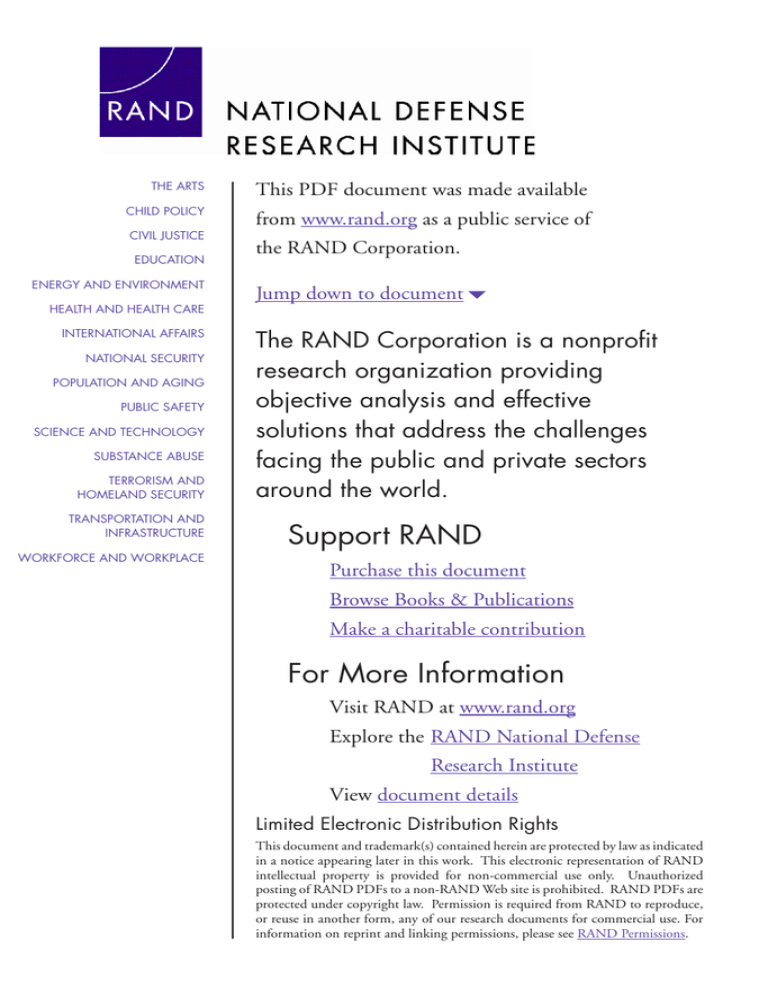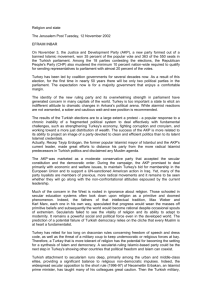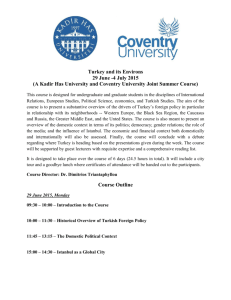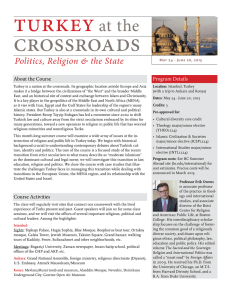6 The RAND Corporation is a nonprofit from
advertisement

THE ARTS This PDF document was made available CHILD POLICY from www.rand.org as a public service of CIVIL JUSTICE EDUCATION ENERGY AND ENVIRONMENT HEALTH AND HEALTH CARE INTERNATIONAL AFFAIRS NATIONAL SECURITY POPULATION AND AGING PUBLIC SAFETY SCIENCE AND TECHNOLOGY SUBSTANCE ABUSE TERRORISM AND HOMELAND SECURITY TRANSPORTATION AND INFRASTRUCTURE WORKFORCE AND WORKPLACE the RAND Corporation. Jump down to document6 The RAND Corporation is a nonprofit research organization providing objective analysis and effective solutions that address the challenges facing the public and private sectors around the world. Support RAND Purchase this document Browse Books & Publications Make a charitable contribution For More Information Visit RAND at www.rand.org Explore theRAND National Defense Research Institute View document details Limited Electronic Distribution Rights This document and trademark(s) contained herein are protected by law as indicated in a notice appearing later in this work. This electronic representation of RAND intellectual property is provided for non-commercial use only. Unauthorized posting of RAND PDFs to a non-RAND Web site is prohibited. RAND PDFs are protected under copyright law. Permission is required from RAND to reproduce, or reuse in another form, any of our research documents for commercial use. For information on reprint and linking permissions, please see RAND Permissions. This product is part of the RAND Corporation monograph series. RAND monographs present major research findings that address the challenges facing the public and private sectors. All RAND monographs undergo rigorous peer review to ensure high standards for research quality and objectivity. The Rise of Political Islam in Turkey Angel Rabasa t F. Stephen Larrabee Prepared for the Office of the Secretary of Defense Approved for public release; distribution unlimited NATIONAL DEFENSE RESEARCH INSTITUTE This research was sponsored by the Under Secretary of Defense for Policy and was conducted within the International Security and Defense Policy Center of the R AND National Defense Research Institute, a federally funded research and development center sponsored by the Office of the Secretary of Defense, the Joint Staff, the Unified Combatant Commands, the Department of the Navy, the Marine Corps, the defense agencies, and the Defense Intelligence Community under contract W74V8H-06-C-0002. Library of Congress Cataloging-in-Publication Data Rabasa, Angel. The rise of political Islam in Turkey / Angel Rabasa, F. Stephen Larabee. p. cm. Includes bibliographical references. ISBN 978-0-8330-4457-0 (pbk. : alk. paper) 1. Islam and politics—Turkey. 2. Islam and state—Turkey. 3. Islam—Turkey— History. I. Larabee, F. Stephen. II. Title. BP63.T8R33 2008 322'.109561—dc22 2008009764 The RAND Corporation is a nonprofit research organization providing objective analysis and effective solutions that address the challenges facing the public and private sectors around the world. R AND’s publications do not necessarily reflect the opinions of its research clients and sponsors. R® is a registered trademark. Cover design by Rod Sato © Copyright 2008 RAND Corporation All rights reserved. No part of this book may be reproduced in any form by any electronic or mechanical means (including photocopying, recording, or information storage and retrieval) without permission in writing from RAND. Published 2008 by the RAND Corporation 1776 Main Street, P.O. Box 2138, Santa Monica, CA 90407-2138 1200 South Hayes Street, Arlington, VA 22202-5050 4570 Fifth Avenue, Suite 600, Pittsburgh, PA 15213-2665 RAND URL: http://www.rand.org To order RAND documents or to obtain additional information, contact Distribution Services: Telephone: (310) 451-7002; Fax: (310) 451-6915; Email: order@rand.org Summary As a Muslim-majority country that is also a secular democratic state, a member of NATO, and a long-standing U.S. ally, Turkey is pivotal to U.S. strategy to shape the Middle Eastern security environment. Turkey is also a key test case for the role of Islam in politics and its influence on external policy. Until recently, Islamic parties in Turkey were largely a fringe movement. However, the success of the Justice and Development Party (AKP) in the past two national elections demonstrates the growing strength of a political movement with Islamic roots. That said, the AKP does not define itself as an Islamic party, and its electoral success does not translate into popular support for an Islamist agenda. Although the AKP won an overwhelming victory in the July 2007 election, it still faces serious challenges, including the possibility that it could be closed down. While the AKP has Islamist roots, it is fundamentally different from its predecessors—the National Salvation, Welfare, and Virtue parties—in terms of its ideology, its political goals, its market-oriented economic program, and the broader range of the electorate to which it appeals. Despite its origins, the AKP government has not pursued an overt Islamist agenda (although critics accuse it of seeking to infiltrate Islamists into the civil bureaucracy and condoning Islamization at the local level). The AKP government has given priority to pursuing Turkey’s European Union (EU) membership, economic stabilization, and reform of the legal system over divisive symbolic issues such as the Islamic headscarf controversy. Secularists, however, worry about “creeping Islamization.” ix x The Rise of Political Islam in Turkey Alternative Political Futures How deep-seated Turkey’s (and the AKP’s) transformation is and the impact it will have on Turkey’s future political development and foreign policy orientation remain open questions. In the aftermath of the July 2007 elections, the AKP has substantially strengthened its hold on power. A senior party member, former Foreign Minister Abdullah Gül, has been elected president, fundamentally altering the previous political landscape in which a secularist president counterbalanced the AKP-dominated parliament. The party’s future remains uncertain, as a result of the indictment forwarded to the Constitutional Court in March 2008 calling for the closing of the party for violating the principles of secularism. Over the next decade, Turkey could evolve in a number of different ways. Four possible “alternative futures” for Turkey are described below. Some are more likely than others, but all are plausible enough that they deserve serious consideration and analysis. Scenario 1: The AKP Pursues a Moderate, EU-Oriented Path In this scenario, the AKP solidifies its hold on power and maintains a moderate path, not allowing Islamist impulses in its foreign policy to derail its EU-oriented course. Some erosion of the restrictions on public expressions of religiosity occurs, and individuals are given greater latitude to express a more visible Islamic identity. However, no attempt is made to introduce Islamic legislation, such as Islamic legal codes. At the same time, efforts are made to reduce the political role of the military. The AKP government also seeks to loosen restrictions on religious minorities. Until early 2008, this seemed to be the most likely scenario. However, the indictment of the AKP forwarded by the Public Prosecutor to the Constitutional Court has called this assumption into question. If, in the end, the AKP is not closed and remains in power, it is likely to be more cautious about pressing for measures that could be perceived as changing the secular-religious balance or provoking the secularists into another attempt to remove it from power. The presence of AKP members and religious-school graduates in the government bureaucracy is Summary xi likely to continue to expand. At the local level, some AKP-run municipal councils are likely to continue efforts to infuse their conception of Islamic morality into public policy. There are, however, structural limits on how far a reelected AKP government can go in opening space for Islam in the public sphere. The Kemalist establishment remains largely intact. Any government that crosses the lines that define the acceptable role of religion in politics risks accentuating political tensions and possibly provoking intervention by the military. In addition to the political constraints posed on the AKP’s freedom of action by the military and secular elements in the bureaucracy, the judiciary, and the higher educational establishment, two other factors argue for a moderate course by an AKP government. One is the moderate and pluralistic tradition of Islam (discussed in the chapter on the Islamic landscape in Turkey). Rigid Salafi interpretations of Islam have never taken root within a broad sector of the Turkish population. Public-opinion polls show that there is little support in Turkey for an Islamic state.1 A large majority of Turks, including religious Turks, support the secular state. The other factor arguing for a moderate course is that Turkey is imbedded in the West, institutionally, economically, strategically, and, to a significant degree, culturally as well. Over the past two decades, Turkey has converged significantly with European norms. Important gaps remain, but the trends are clear. The implication of this is that Islamic politics in Turkey are affected more by the international context than is generally the case in the Middle East. Although these considerations argue for a moderate trajectory for religious politics in a democratic and increasingly globalized Turkey, other, less positive outcomes are possible. Three possible alternatives are described below. 1 For instance, a poll by the highly respected Turkish Economic and Social Studies Foundation (TESEV) published in 2006 found that only 9 percent of the Turkish population favored a state based on the shari’a (down from 21 percent in 1999). See Ali Çarkoğlu and Binnaz Toprak, Değişen Türkiye’ de Din Toplum Ve Siyaset, Istanbul: TESEV, 2006, p. 11. xii The Rise of Political Islam in Turkey Scenario 2: Creeping Islamization In this scenario, the reelected AKP government pursues a more aggressive Islamist agenda. With full control of the executive and legislative branches of government, the AKP is able to appoint administrators, judges, and university rectors and even to influence personnel decisions in the military. In foreign policy, the AKP intensifies ties to the Muslim world, especially to Iran and Syria. Faced with growing opposition in Europe to its bid for EU membership, the AKP turns to an effort to create a competing Islamic bloc. “Creeping Islamization” is the scenario that worries most secularists, many of whom fear that the AKP harbors a hidden agenda to Islamize Turkish society. However, in our view, this scenario is less likely, for several reasons. First, it would lead to greater political polarization and would likely provoke intervention by the military. Second, most Turks support a secular state and oppose a state based on the shari’a. Third, EU membership has been a core element of the AKP’s foreign policy. While discontent with the EU has been increasing, EU membership is still supported by more than half of the Turkish population. Scenario 3: Judicial Closing of the AKP In this scenario, the Constitutional Court closes down the AKP. Closing down the AKP, however, would solve little and could lead to a deepening of the crisis. As its strong showing in the July 2007 elections underscores, the AKP enjoys broad political support throughout the country. If it is closed, the party is likely to simply reemerge under another name—as happened when the MSP (National Salvation Party) and the RP (Welfare Party) were banned. Closing the AKP would also increase strains with the EU and further complicate Turkey’s quest for EU membership. Scenario 4: Military Intervention A fourth possibility is an escalation of social tensions that leads to intervention by the military. A confrontation could take place if the AKP takes actions seen by the military as crossing important lines. The military-intervention scenario has two possible variants: (1) a “soft coup,” where the military mobilizes social pressure against the AKP, Summary xiii eventually forcing it to resign, and (2) a direct military intervention leading to the forcible removal of the AKP government and the disbanding of the party. While direct intervention by the military cannot be excluded from consideration, especially if the AKP begins to push an Islamic agenda more aggressively, it is not very likely and would occur only as a last resort after the military had exhausted all other options. Implications for U.S. Policy The examination of Islam’s role in Turkey leads to several conclusions and implications for U.S. policy. The first relates to the nature of Islam in Turkey and its role in Turkish political life. Turkey has a long history, dating back to the late Ottoman period, of seeking to fuse Islam and Westernization. This differentiates Turkey from other Muslim countries in the Middle East and enhances the chances that it will be able to avoid the sharp dichotomies, ruptures, and violence that have characterized the process of political modernization in the area. This is important, because it goes to the heart of the issue of the compatibility of Islam and democracy. The ability of a party with Islamic roots to operate within the framework of a secular democratic system while respecting the boundaries between religion and state would refute the argument that Islam cannot be reconciled with modern secular democracy. On the other hand, if the experiment fails, it could lead to greater secular-Islamic polarization, further reducing the middle ground needed to build the moderate Muslim bulwark needed to contain the spread of radicalized Islam. Beyond Turkey, the accommodation of Islam with democracy and secularism that has been achieved there is a valuable resource in the current ideological conflict between radical and mainstream interpretations of Islam. Mainstream entities in Turkey, therefore, should be encouraged to partner with groups and institutions elsewhere in the Muslim world to propagate moderate and pluralistic interpretations of Islam. xiv The Rise of Political Islam in Turkey U.S. policymakers should be cautious, however, about portraying Turkey as a “model” for the Middle East. That notion makes many Turks, especially the secularists and the military, uncomfortable, because they believe that it pushes Turkey politically closer to the Middle East and weakens Turkey’s Western identity. In addition, they fear that it will strengthen political Islam in Turkey and erode the principle of secularism over the long run. A second conclusion relates to the sources of Turkey’s transformation. The growing strength of political Islam in Turkey (or rather, of politics informed by Islam) has been largely a response to internal factors, particularly the democratization and socioeconomic transformation of Turkish society over the past several decades. An important corollary to this point is that the United States may not have much leverage in this sphere. It also highlights the importance of cultivating new and diverse elites. Third, it is an oversimplification to see the current political tensions in Turkey as a struggle between “Islamists” and “secularists.” Rather, these tensions are part of a struggle for power between newly emerging social sectors and the secularized elite—a struggle between the “periphery” and the “center”—that has deep roots in Ottoman and recent Turkish history. The democratization of Turkish society since the mid-1980s has opened up political space for forces that had been largely excluded from politics (including Islamists) to organize and propagate their views. Fourth, while the AKP has Islamic roots, it enjoys broad-based political support that transcends religious, class, and regional differences. Its widespread social networks and efficient party machine, with close ties to local constituencies, have enabled it to gain strong support among the poor and marginalized groups that make up a growing portion of Turkey’s urban areas. At the same time, its liberal, free-market economic policies attract the provincial entrepreneurial classes that are socially conservative but integrated into the global economy. The AKP’s support for democratic reform and its tolerant policy toward minorities have also enabled it to obtain the support of many members of minority communities. Summary xv Fifth, in the past decade, the AKP has undergone an ideological transformation, abandoning the anti-Western rhetoric that characterized its Islamist predecessors and embracing a new discourse that emphasizes values consistent with those of Western societies. This shift is most visible in the AKP’s position on Turkish membership in the EU. The shift has resulted in an important realignment in Turkish politics. In the past, the Kemalists were the main proponents of close ties to the West and Western integration. In recent years, however, this role has increasingly been assumed by the AKP. Ironically, as the AKP has pressed forward with reforms designed to bring Turkey into conformity with EU norms and regulations, some sectors in the Kemalist establishment and the military have begun to worry that EU membership and further democratization could undermine Turkish security, as well as their own political role. Turkey’s prospects for attaining EU membership remain uncertain. While the EU Commission supports continuing accession negotiations, opposition in Europe to Turkish membership is growing—on cultural as well as political grounds. Although the United States is not a member of the EU, it has a stake in how the membership issue is managed. Turkey’s integration into the EU would strengthen the EU, as well as Turkey’s Western orientation, and would rebut the claim that the West—especially Europe—is innately hostile to Muslims. On the other hand, rejection of Turkey’s candidacy could provoke an antiWestern backlash, strengthening those forces in Turkey that want to weaken Turkey’s ties to the West. Sixth, Turkish policy toward the Middle East is likely to remain a sensitive issue in bilateral U.S.-Turkish relations. Turkey’s growing interests in the Middle East are likely to make Ankara wary about allowing the United States to use its military facilities for regional contingencies except where such operations are clearly perceived to be in Turkey’s interest. This argues for a diversification of U.S. access options that would provide alternatives to Incirlik Air Base in case Turkey increases restrictions on U.S. use of it or other Turkish facilities. The Armenian genocide resolutions periodically introduced in the U.S. Congress could also cause strains in relations with Ankara in the future. In 2007, the Bush administration succeeded in getting a geno- xvi The Rise of Political Islam in Turkey cide resolution (HR-106) shelved at the last second, narrowly averting a serious crisis with Ankara. However, the resolution is likely to be reintroduced and to remain a potential source of discord. Future administrations will need to work closely with congressional leaders to ensure that the Armenian issue does not poison future relations with Turkey. The United States also needs to deal more resolutely with the terrorist attacks against Turkish territory by the Kurdistan Workers’ Party (PKK). In Turkish eyes, the PKK issue is the litmus test of the value of the U.S.-Turkish security relationship. How the United States responds to this issue will have a seminal influence on the tenor of U.S.-Turkish relations over the next decade. The closer military and intelligence cooperation with Ankara against the PKK since Prime Minister Recep Tayyip Erdoğan’s visit to Washington in November 2007 has helped to defuse some of the mistrust and tension in bilateral relations that has built up since—and, to a large degree, as a consequence of—the Iraq war. But it needs to be followed up by other concrete steps. In particular, the United States should put greater pressure on the Kurdistan regional government to crack down on the PKK and cease its logistical and political support of the group. At the same time, while a tough anti-terrorist program is an important component of a strategy to defeat the PKK, it must be combined with social and economic reforms that address the root causes of the Kurdish grievances.






